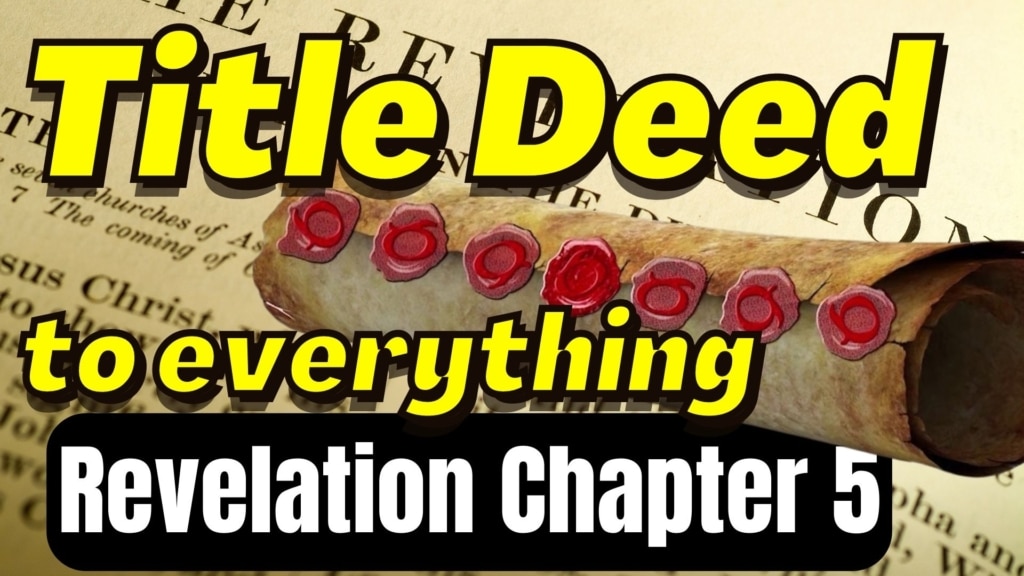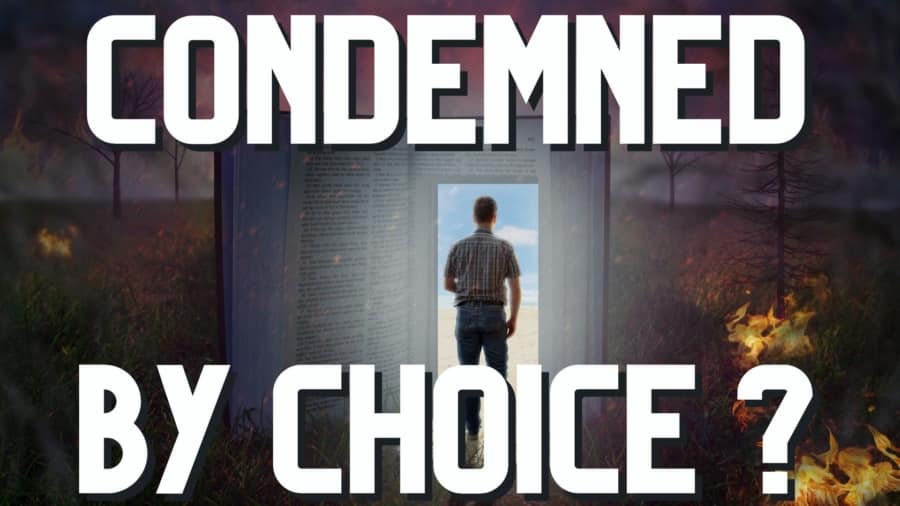Who is worthy of owning everything? Who is worthy of claiming the title deed to the earth? Jesus Christ, of course.
Revelation 5:1 starts, “I saw in the right hand of Him the sat on the throne.” That’s significant because we know that at the resurrection of Jesus Christ, according to Psalm 110:1, where was Jesus seated? “Sit at my right hand until I make your enemies a footstool for your feet.” So, the Lord Jesus is going to have to go very far to receive this from the Almighty, because He’s right there. “In the right hand of Him who sat on the throne, a scroll written inside and on the back, sealed with seven seals.” What is the significance of being written inside and on the back? It was typical of a title deed in the ancient world that it would be written front and back and then it would be sealed. The fact that it’s sealed with seven seals shows something very important. To break the seal, back then, you had to be the person to whom the deed was given.While weeping and as John admits, he reports in Revelation 5:5 that “One of the elders said to him, “Behold the lion of the tribe of Judah has prevailed.” When did Jesus prevail? Obviously, on the cross. “It is finished.” That was Christ’s victory. “He has prevailed to open the scroll and to lose is seven seals. “And I looked,” John says in Revelation 5:6, “and behold, in the midst of the throne and of the four living creatures and in the midst of the elders stood a Lamb.” Jesus, The Lamb of God, is standing “as though it had been slain having seven horns and seven eyes.” Once again, symbolism is being used. It’s not always describing the actual appearance of the person is describing something about them. And the horn in Scripture is a symbol of strength, power, and authority. And the eyes, intelligence. “So it had seven horns and seven eyes, which are the seven spirits of God set out in the earth. And he came and he took the scroll out of the right hand of him who sat on the throne when he had taken the scroll. The four living creatures and the 24 elders fell down before the lamb, each having a harp and golden bowls of incense which are the prayers of the saints.” Did you ever stop and think that every prayer you pray is on record? And it says here that the prayers are incense offered before God. Before the veil separating the Holy of Holies, the assigned priest would light the altar of incense and the smoke of it would go up. And what was it a picture of? It was a picture of the prayers of the saints.
In Revelation 5:9,” they sang a new song.” Who is singing the new song? Well, it’s the elders and those who are with it, and I include us in that group. They sang a new song. “You are worthy to take the scroll and open a seal for you were slain.” The idea of redemption when it relates to people has the slave market in mind. You’re a slave. You’re standing on the slave block. Redemption means to pay the price to set you free and then you were let go. That’s the idea of redemption. “You have redeemed us to God by your blood out of every tribe and tongue.” No group not represented. And notice in Revelation 5:10, “you have made us kings and priests.” Who again are these people? Church age believers. No Old Testament believer was King Priest. 1st Peter 2:9 says, “we are a royal priesthood.” The very fact that these people are singing and saying, “You redeemed us and you have made us kings and priest,” tell us, those are church age believers. Are any believers in the tribulation going to be royal priests? No. Church age only. That’s one of the privileges we have that no one of any other time of history is going to enjoy among many, many of the things that we have in Christ.
Revelation 5:10 concludes, “…and we shall reign on the earth.“ One day I believe each one of us is going to be a lot of certain responsibilities in the Kingdom of the Lord Jesus Christ. And we’re going to exercise authority. John says in Revelation 5:11, “Then I looked, and I heard the voice of many angels around the throne, the living creatures and the elders, and the number of them was 10,000 times 10,000 saying with a loud voice say, ‘Worthy is the lamb who was slain to receive power and riches and wisdom and strength and honor and glory and blessing.” Now we’ve had the first chorus church sing, second the second chorus is angels. Revelation 5:13 says, “and every creature which is in heaven and on the earth and under the earth, and as are in the sea and all that are in them. I heard saying blessing and honor and glory and power be to him who sits on the throne under the Lamb forever and ever.” There is a day coming when every created thing is going to be singing praises to Jesus Christ. In fact, the Old Testament tells us that when the kingdom begins, the mountains and the hills and the trees and the rivers will begin to sing. You might think that this is just imagery. When Jesus rode into Jerusalem and the Pharisees rebuked his disciples, to stop speaking messianic prophecy. Jesus replied, “I tell you of these keep silent the rocks of the earth would cry out. I believe it’s going to happen one day. I can’t wait to see all creation, just joining in and singing, “blessing and honor and glory and power to Him who sits on the throne in the land forever and ever. Revelation 5:14, ends the chapter, “The four living creatures said, ‘Amen!” and the 24 elders fell down and worshiped Him, who lives forever and ever.” That is the last beautiful picture that you’re going to see until Chapter 20.




